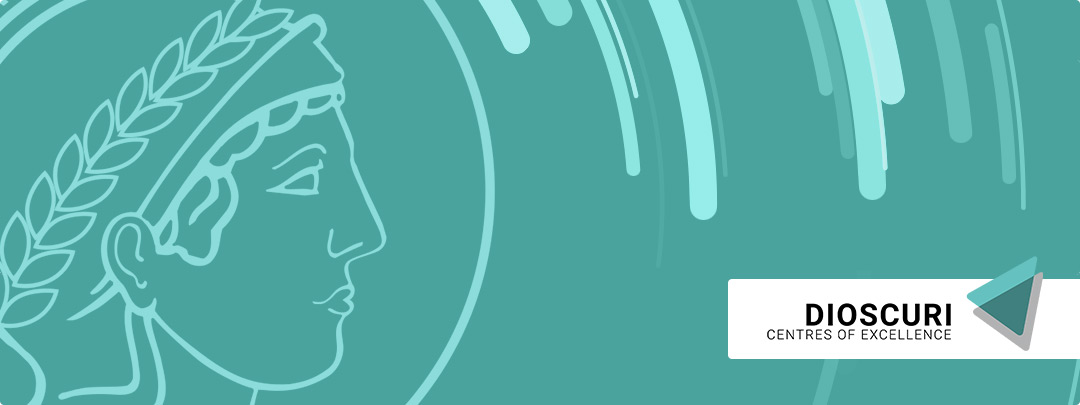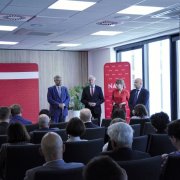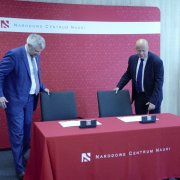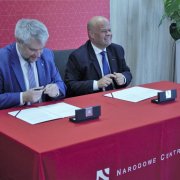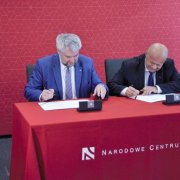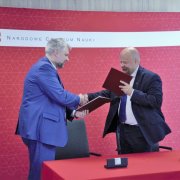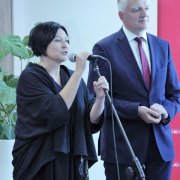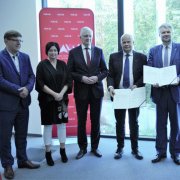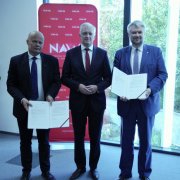Paweł Dłotko, Gracjan Michlewski and Bartłomiej Wacław will each set up a research group in Warsaw. They prevailed against 24 applicants from all over the world and have been selected as the new Dioscuri leaders in the second call published by the Max Planck Society and the National Science Centre Poland.
The scientists will start establishing their respective research groups in the second half of 2020. Coming from different scientific backgrounds, the three of them share similar career paths: after completing their studies and PhDs in their native Poland, they went abroad for postdoc positions at prestigious research institutions. Each of them has held a position at a British university for the past few years, and will now be returning to build up a centre of scientific excellence in Warsaw – striving to conduct top-class internationally competitive and innovative research.
Starting next year, Paweł Dłotko will establish the Dioscuri Centre in Topological Data Analysis at the Institute of Mathematics, Polish Academy of Sciences. He will be supported in his endeavours by his partner in Germany – Dmitry Feichtner-Kozlov from the Institute of Algebra, Geometry, Topology and its Applications at the University of Bremen. The aim of this interdisciplinary research group is to develop and implement tools of Topological Data Analysis as well as to bring them to the various disciplinary communities. “We will find mathematically correct solutions to practical problems”, says Dłotko. “We will build new rigorous and explainable data shape descriptors in data science, analyse time series from cancer biology, climate research and economics, examine medical images of neurons, airways, spongy bone, and search for the best performing materials for CO2 capture and more“, adds the 35-year-old mathematician. Dłotko has been working as a Senior Lecturer in mathematics at Swansea University (UK) since 2017.
Another Dioscuri Centre will be launched by Gracjan Michlewski. The RNA biologist will establish the Dioscuri Centre for RNA-Protein Interactions in Human Health and Disease at the International Institute of Molecular and Cell Biology in Warsaw. His partner in Germany is Juri Rappsilber from the Institute of Biotechnology at the Technische Universität Berlin. Together, they will investigate the cellular roles and structural characteristics of novel RNA-binding proteins (RBPs) and RNA-protein interactions. The major focus of their investigations will be on the RNA-protein interactions in innate immune response to RNA viruses including influenza, commonly known as the flu. “RNA viruses have already caused several epidemics in the 21st century; the emergence of a new influenza pandemic or a viral bioterrorism attack could have catastrophic consequences on public health and the world economy. Thus, a detailed molecular understanding of host-virus interactions is imperative in order to know how best to inactivate the virus and prevent major disruptions”, says Michlewski, who is currently working as a Senior Lecturer at Edinburgh Biomedical School, University of Edinburgh (UK) and Associate Professor at the Zhejiang University-University of Edinburgh Institute (China).
As for the third of the three new leaders, Bartłomiej Wacław will establish the Dioscuri Centre for the Physics and Chemistry of Bacteria at the Institute of Physical Chemistry, Polish Academy of Sciences. Arne Traulsen from the Max Planck Institute for Evolutionary Biology in Plön will support him as the German partner. The Dioscuri Centre will use experiments, computer simulations and mathematical theory to create data driven, quantitative models of bacterial growth and evolution in complex environments: the interior of animal cells and animal secretions such as mucus. Research performed at the Centre will contribute towards the understanding of bacterial infections and the evolution of antimicrobial resistance in animal and human hosts. The theoretical physicist explains: “While the focus of the Centre will be on basic research in simple in vitro models, the long-term goal is the creation of quantitative, predictive models of bacterial infections that could be applied to develop new antimicrobial therapies.” Wacław is currently working as an Associate Professor at the Institute for Condensed Matter and Complex Systems at the University of Edinburgh (UK).

Group Leaders of three new Dioscuri centers: Paweł Dłotko, Gracjan Michlewski and Bartłomiej Wacław (left to right). @private
The Dioscuri Programme, which was initiated by the Max Planck Society, is jointly managed with the National Science Centre Poland (NCN) and aims to establish internationally competitive research groups in Poland. Together with the two Dioscuri Centres established already, five of the ten planned Dioscuri Centres in Poland have now been selected. Each of the centres is financed with up to 1.5 million euros for a period of five years. The costs are shared equally between the Federal Ministry of Education and Research (BMBF) and the Polish Ministry of Science and Higher Education (MNiSW), while the host institutions in Poland provide the infrastructure.
The third call for Dioscuri Centres was published in December 2019 and is open to applicants from all scientific disciplines, including the humanities, social sciences, life sciences and natural sciences, until 23 March 2020. For more information, please visit https://ncn.gov.pl/dioscuri/dioscuri3
